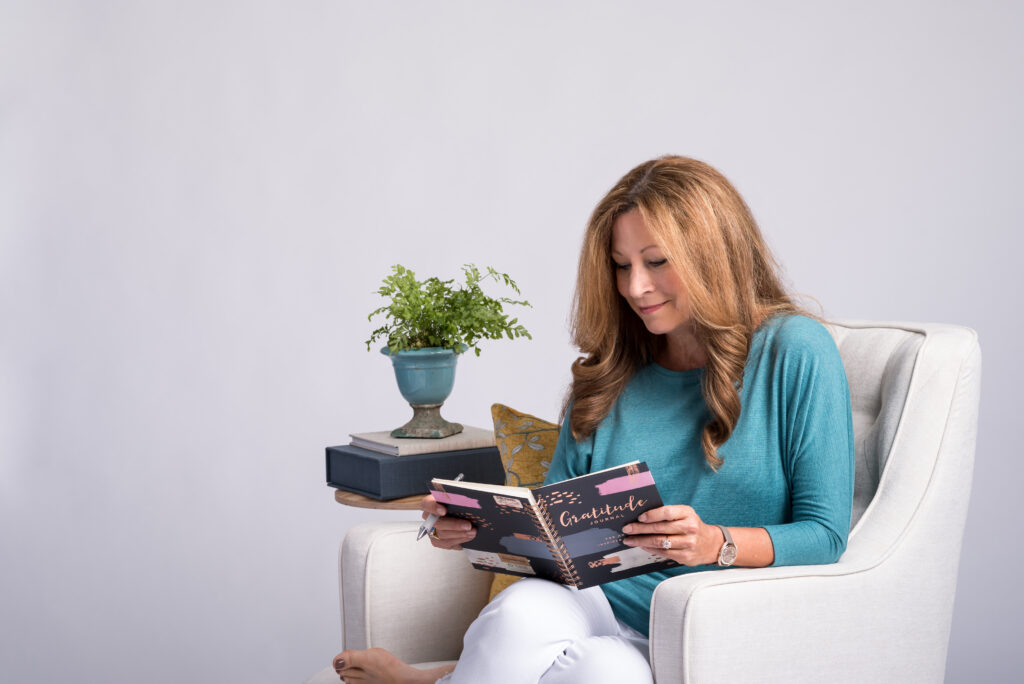How to Journal to Improve Your Life
I keep hearing that many of you want to start a journal practice, so I’ve written this post to help you do that. Here is how to journal to improve your life.
I’ve been writing in journals for at least 20 years and I consider my journal practices to be a cornerstone to a balanced and full life.
You can improve your life in just 15 minutes a day by journaling! Writing every day in a journal can improve your mood, how you think, and even your health! It is the best tool for getting to know yourself better.

The Purpose of a Daily Journal
There is one reason that makes journaling a worthwhile endeavor. This reason is, you will get to know yourself in a way that you can’t in any other way.
Writing daily, in your journal is the best way to develop a strong relationship with yourself.
This is probably the most important thing you can do in life and especially in midlife. As women, we have spent our adulthood working and often caring for others: our partners, our children, and perhaps our parents.
It’s no surprise that at some point, we feel like something is missing from our lives and we wonder what it is.
Then begins the search for this missing piece.
Spoiler alert. Nothing is missing. Yet, something is missing. What’s missing is not a thing. What is missing is a deep trusting relationship with yourself.
Why Do People Journal?
There is no one reason to journal—just as we are all unique—our journals and the reasons we journal are unique too!
As I said in the beginning, the main purpose of writing in a journal is to be in a relationship with yourself. Getting to know yourself can take many aspects.
Journaling is helpful for many different reasons:
- Clear your head from jumbled thinking
- Make connections around your thoughts, feelings, and actions
- Reduce stress
- Access inner wisdom
- Find answers to problems
- Track progress
- Find purpose
- Create goals
- Express gratitude

What is Journaling?
For the purpose of this post, I am defining journaling as an intentional practice of writing to create change or well-being.
The two important parts are that the process are that the practice is intentional and that the writing has a purpose.
I would add one more component to journaling and that is that it is consistent. When you have a journaling practice, you do it daily or most days. But there is a consistency and commitment to it.
Journaling is the process of creating a relationship with yourself through writing on a daily basis. Like any other relationship, it improves with commitment and consistency.
I’ll talk more about types of journaling later, but for now think of it simply as a daily writing practice. You have a pen, something to write in, and you do it daily.
How easy is that?
What Type of Journal Works Best?
If you look up journals to buy, you will see thousands of options, from plain, to decorative, to expensive leather-bound ones.
However, a plain notebook is great too. I have used inexpensive composition notebooks for 20 years. The size is bigger than traditional journals but still smaller than spiral bound notebooks. I find the size and shape perfect for me.
I also like cheap composition books for another reason. When I try to journal in a beautiful or more expensive journal, I find myself trying to write neater or to pretty up my words.
An inexpensive notebook invites the writer to be honest and messy at times. You don’t worry about wasting paper, how you write, or what you write.
Truly, the best type of journal to use is one that you will actually use. I do recommend pen to paper for journaling though. However, beyond that, it is totally up to you. Experiment with different kinds until you find what you like best.
5 Reasons to Journal
Why do you want to journal?
I think there is a calling to know ourselves better. For me, keeping a journal is my number one way that I get to know myself.
We all have so many thoughts going on in our brains all day long, that it is difficult to make sense of it all.
Even when I have a brilliant thought, I often forget it if I don’t write it down. Journaling helps me take the tangled thoughts and gets some of them out of my head and onto paper.
One form of journaling that I do is just getting thoughts on paper without censoring or trying to make sense of it.
As you do this practice, you’ll start looking forward to it. I have it on my calendar and make it my priority every morning.
Here are my favorite reasons to write in a daily journal:
Have a relationship with yourself
Many women express to me that they have a longing for something more. I hear this from many women who otherwise have great lives. Yet, something feels missing for them.
I believe that this missing part is a deep understanding of themselves and a trusting relationship with themselves.
This is why I love the practice of keeping a journal; it allows me to understand myself better and has allowed me to develop a deep and trusting relationship with myself.

Access inner or outer wisdom
Another reason to journal, is that in the act of writing, you have access to wisdom you wouldn’t otherwise.
Now I can’t say for sure whether it is a wisdom that resides inside of you or that is an outer wisdom such as god but there is definitely access to wisdom in writing!
Now that I am more aware of this, I am so much more intentional in asking for help in answers.
Often if I have something troubling me, I will write about it and get all those thoughts out. Then I will ask for an answer or for some helpful ideas.
I am always surprised when I get a detailed and helpful answer that isn’t something I had thought about before.
I’ve now come to depend on this wisdom for daily help.
Express gratitude
Gratitude journals have been popular for a while. The idea is that every day, you write down what you are grateful for.
A common example is to write five things each day that you are thankful for.
While this cannot hurt, I didn’t find it particularly helpful on its own. What works better for me, is to write down one to three things and write about them more fully and capture the experience.
A few years ago, I did a month-long experiment with gratitude and found that a gratitude practice was very beneficial! I became much more intentional about gratitude.
Over the years though, I had tried other methods such as the five-a-day method that is often recommended.
When I go back and find these old gratitude lists, they are rather dry. When I come across old gratitude experiences, I can recapture that feeling.
You can work gratitude into a daily journal easily and it can be helpful in training your brain to look for more helpful things.
Whining, venting, and complaining
I take all my problems to my journal. Over the years, I have written about pretty much everything that I have gone through.
Your journal is a SAFE place to express all your thoughts, not just the pretty ones. You can take your complaints, grumbles, anger, sadness, hurt, and frustration to your journal when you need to.
It can be so helpful to get it out of your head and onto the paper!
I used to do that much more than I do now. I was ashamed about how much crap I had in my head. But I trusted the process.
Believe me, it’s much better to get these things out of your head. Seeing them on paper is not always fun.
Yet, those feelings are normal and human, and you are normal and human for having them.
By acknowledging them and feeling them, you are learning to accept ALL of yourself. Not just the parts you think are socially acceptable.
Reduce stress and promote balance in your life
Journaling does not make all your problems go away. However, it does give you a place to explore anything and everything you want.
Having this outlet can help reduce stress and create more balance in your life if you commit to doing it daily, or almost daily.
Health Benefits of Journaling
There are studies that have shown that writing affects heart rate, blood pressure, and the immune system.
Writing in your journal daily can improve your mood and reduce symptoms of depression.
I have symptoms of ADHD and writing daily, definitely is a huge help to me in untangling my thoughts and feeling more organized in my thinking.
Writing is also helpful for dealing with anxious thoughts and can improve your sleep. I usually write in the morning, but writing at night before bed is great too.
How to Set up Your Journaling Practice
First of all, decide what you will journal in. I fill up about one composition book a month. They are 100 pages and I aim for three pages a day. Sometimes it is more and sometimes it is less.
Then decide on a pen and have several on hand or have plenty of refills. I use Dr. Grip and I buy refills for it. Keep this supply in your journal area.
Decide when you want to journal and allow about 15 minutes for it. I love to journal first thing in the morning, in bed, with a fresh cup of coffee on the nightstand. I keep my journal and pens in the drawer, so they are always right there.
That’s really all there is to it: a notebook, a pen, a place, and a time.
What to Write in Your Journal?
You can write whatever you want! When I started, I just would free write for three pages. I read about that in a book called The Artist’s Way. For years, I just transferred anything that popped up while I was writing onto my three pages without editing, censoring, or directing.
As strange as it might sound, it was very helpful to this jumbled thinker.
Now, I still do some of that. I usually write freely for a page. If something is bothering me, I will then focus on that and explore my thoughts on that. I might do some self-coaching at this point.
Then I like to end with a question for my wisdom and write out what I receive in answer to my question.
Sometimes I just free write the whole time. Sometimes it is more directed.
The important thing is that you do it daily. Try out different things. I really recommend that you free write for a while, so you can get comfortable with whatever comes up.
This is a great practice because you will get to know yourself on a whole new level. And you will have to begin accepting all these shadow parts of yourself.
As much as you will meet your darker side, you will also discover your best, truest, and most brilliant and creative side of yourself!
So, get it all out there and in your journal. It might seem intimidating at first. Write about that. Don’t worry too much about WHAT to write. Instead concentrate on just writing at first.
Let it be free, fun, and messy.

Keep showing up my friends,
Sara
Ready to find out more?
Schedule a free consultation today.
Coach with Me!

Hi, I'm Sara Garska and I'm so happy you're here! Big changes can happen with a shift in thinking. Over time, you transform your life into the one you always dreamed of having. As a certified life and weight loss coach, I can help you create a life you love. Click here to schedule a free 50-minute coaching session.
